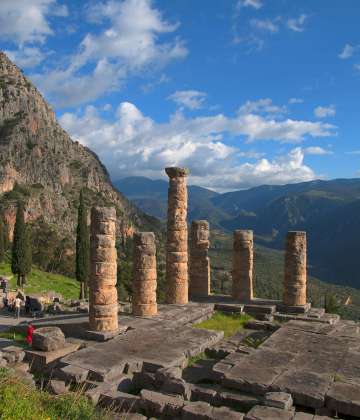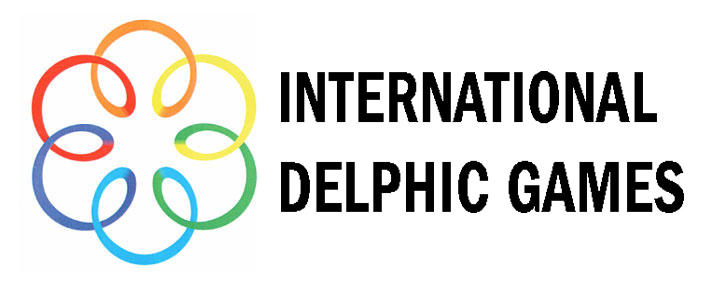History – A Fulfilling Journey from Myth to Reality
The Greek city of Delphi, Oracle, and Apollo Temple were considered the spiritual centre of the world in ancient times. The Delphic Games that occurred here have left a significant mark in modern times as well. During the 15th Century B.C., Oracle was considered a holy place where pilgrims came to consult Gods for crucial decisions. As per the saga, Apollo killed Oracle’s keeper – the dragon python and thus, the Oracle became Apollo’s shrine.
In memory of Apollo’s victory over Python and his self-inflicted penance, the Delphic Games (also called Pythian / Pythic Games) were held for peaceful competition. From 582 B.C., the Games were conducted every four years, one year prior to the Olympic Games. Amphictyony, an executive council of twelve Greek clans’ representatives organized the games and dedicated them to Apollo – the God of beauty, healing, poetry, art and light. The focus of the competition was always on artistic elements like music, painting, acting, dance, and more; and therefore, many contemporaries described the games as more magnificent than the Olympics.
During the holy Delphic Peace and Games, weapons were laid down, ensuring peace and safety for everyone. People soon realised the importance of peace for the successful thriving of cultural exchange and spiritual perfection. Unfortunately, not much documentation has survived of the games, but the writings of Aristotle beautifully create an impression of the festivities.
Conducted over a period of 6-8 days, the ceremonies included a festive procession, a huge feast and the games from the fourth day onwards. The Theatre of Delphi was home to music and drama competitions, chariot races were held on Krisa, while athletic competitions were held in the stadium.

Winners at the games were awarded a crown of laurel leaves, like the olive branch in Olympics. Statues were also erected in honour of certain competitors. Every city supported their participants in every way as the victor brought a lot of honour and esteem to their home town. Also, thousands of audience members travelled to Delphi during this time and brought considerable revenue into town. In 394 A.D., Theodosius, the Emperor of Rome and Byzantium banned the Delphic and Olympic games as being pagan events.
Finally, 1600 years later the IDC was formulated and started the first Youth Delphic Games in 1997 in Georgia and first Delphic Games for adults in 2000 in Russia.
4000 B.C.
First traces of a settlement in Delphi at the site where the shrine of Athena Pronaia was build later.
1500 B.C.
First provable worshipping of the earth goddess Gaia in Delphi. First prophecies are made by reading water currents and the rustling of leaves. The dragon Python is said to protect the oracle.
1200 B.C.
Apollo takes hold of the shrine. He drives out the earth goddess Gaia and kills Python.
800 B.C.
The Apollo oracle in Delphi reaches high significance in the life of the Greek “nation” and becomes the centre of “Pan-Hellenism”. The Greek tribes and cities consult the oracle before all important under-takings (i.e. war, founding of colonies)
600 B.C.
At the instigation of the Athenian family Alkmenoid, the burnt-down Temple of Apollo is rebuilt.
600 - 590 B.C.
First Holy War. The war results in the Delphic inhabitants’ rebellion against the predominance of the neighbouring city of Krisa, the main place of Phokis, which exerted a kind of protectorate over the shrine. With the Athenians’, Thessalians’ and others help; the Delphic residents win against Krisa. From that time on, Delphi is formally administered by an “Entire Greek Council”
582 B.C.
The Pythian Games reach their final form. They are held every four years.
560 B.C. approx.
Building of Sikyon’s treasure house.
548 B.C.
Apollo Temple in Delphi is destroyed through fire.
525 B.C. approx.
Building of treasure house of Siphnos.
518 B.C.
Birth of Pindar, whose religious poetry is strongly influenced by Delphi, who celebrates many winners of the Pythian Games in his Ephiniks.
4000 B.C.
Battle of Marathon. The Greeks win over the Persians and thereby foil their attempt to subjugate Greece.
490 - 485 B.C.
With the booty of their victorious war against Persia, the Athenians build their treasure house in Delphi.
480 B.C.
Battle of Salamis. The Greek scatter the Persian fleet and force Xerxes to retreat. Falling boulders destroy Athena Pronay temple in Delphi.
448 B.C.
Second Holy War. Delphi’s inhabitants revolt against the Athenians’ and Pericles’ decision to return the shrine to the Phokers. With the help of Sparta Delphi regains its independence.
400 B.C.
Building of the gymnasium and theatre in Delphi.
418 B.C.
Pindar’s death.
405 B.C.
With the Battle of Aigospotamoi the Peloponnesus War ends. Predominance of Sparta in Greece.
373 B.C.
An earthquake destroys the Apollonian Temple in Delphi.
356 - 346 B.C.
Third Holy War. The Phokers, supported by Athens and Sparta, try to snatch Delphi’s Shrine away from Theben. Philip II of Macedonia intervenes in the battle on Theben’s side and gets both Phokerian votes in the Amphicktyonian Council.
370 B.C.
Beginning of the reconstruction of the new Apollonian Temple.
356 B.C.
Alexander the Great is born.
340 - 338 B.C.
Fourth Holy War. Macedonia finally gains predominance in Greece. The war is triggered off by Amphissa’s intention to cultivate the plain of Krisa, which was to be left untilled. Philip II destroys Amphissa and beats Athens and its allies decisively at Chaironeia.
200
The Delphic Shrine reaches a new heyday under Hadrian and his successors.
340 B.C.
The new Apollonian Temple in Delphi is finished.
336 B.C.
Philip II dies. Alexander the Great is his successor.
323 B.C.
Alexander the Great dies.
279 B.C.
Aetolia and the Phokers rescue the Delphic Shrine from the Gauls under Brennus.
190 B.C.
The Aetolian alliance loses control over the Shrine and the Oracle to the Romans, who beat Antiochos II of Syria at Magnesia.
168 B.C.
Battle at Pydna. Perseus, king of Macedonia, is beaten decisively by the Romans. The region becomes a Roman province. The eastern Mediterranean region is annexed by the Roman empire.
86 B.C.
During the war against Milthidates, Sulla confiscates all the Shrine’s valuable oblations.
87 B.C.
Emperor Domitian restores the Apollonian Temple.
87 B.C.
Emperor Domitian restores the Apollonian Temple.
392
Theodosius, Emperor of Byzantium and Rome, declares Christianity state religion. Pagan cults are forbidden.
1892
Théophile Homolle, director of the French Institute in Athens, is granted the right for official excavations in Delphi and makes the shrine’s magnificence accessible for his contemporaries and future generations.
394
The Delphic Shrine is closed.
398
Demolition of Apollonian Oracle-Temple through Arkadios, son of Theodosius.
1676
The English explorer George Wheeler and the French scholar Jaques Spon become aware of Delphi.
1812
Lord Byron, the restless English philhellene, visits Delphi.
1834
The Greek King Otto I visits Delphi – accompanied by the archaeologist Ludwig Ross, representative of the scientific registration of all Greek antiquities.
1870
The German archaeologists Karl Otfried Müller and Ernst Curtius begin with excavations in Delphi, but are stopped from continuing by regional forces.
1894
1500 years after the ban – Founding of the International Olympic Commitee in Paris / France on the initiative of Pierre de Coubertin.
1927 / 1930
Two Delphic Festivals at the archeological site of Delphi, organised by the Greek poet Angelos Sikelianos and his American wife Eva Palmer-Sikelianos – against strong objections from the Greek government.
1960
On initiative of the Greek President Konstantinos Karamanlis the European Cultural Center of Delphi (ECCD) is launched and a Conference Centre is built.
1977
By act of Parliament, the European Cultural Centre of Delphi (ECCD) acquires its present legal status as non-profit cultural organisation in the form of a corporate body governed by private law, under the supervision of the Greek Ministry of Culture and the auspices of the Council of Europe.
1994
1600 years after the ban – Founding of the International Delphic Council in Berlin / Germany on the initiative of J. Christian B. Kirsch with participation of representatives from 18 nations / 5 continents.

